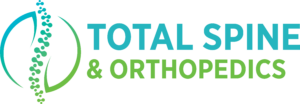

Foraminal stenosis, or narrowing, occurs when the open passageways between the spinal vertebrae (foramina) are encroached upon by displaced bone or soft tissue, often due to degenerative changes in parts of the spine. Spinal nerve roots must travel through these small, hollow archways as they branch away from the spinal cord to reach other areas of the body. If a spinal foramen is obstructed, a sensitive nerve root can become compressed. The resulting pressure on the nerve root can cause it to send faulty signals along its pathway in the form of pain, numbness, tingling, weakness or muscle spasms.
What can cause foraminal stenosis?
Most often, foraminal stenosis results from spinal degeneration that occurs along with the natural aging process. The gradual deterioration of the spinal vertebrae and discs can lead to a number of degenerative spine conditions such as bone spurs, a herniated or bulging disc, arthritis, ligament thickening and facet joint enlargement.
Additionally, spinal injuries that result from trauma, repetitive movement or carrying excess body weight can hasten this process or cause spontaneous degeneration. The resulting structural changes in the spine can further limit the space within a foramen, causing it to become narrower so that there is less space available for exiting nerve roots.
What are the symptoms of foraminal stenosis?
The most common foraminal stenosis symptoms include:
In rare cases, spinal degeneration and its resulting nerve compression can require emergency treatment. For example, it is vital that a patient who is experiencing incontinence of the bladder or bowels, excessive pain or extreme muscle weakness in the legs go to the emergency room right away. These symptoms could be a sign of cauda equina syndrome, a potentially serious disorder that requires urgent medical attention.
If foraminal stenosis creates pressure on the spinal cord or a spinal nerve root, a variety of symptoms can develop. The nature and location of the symptoms vary based on the site of the affected foramen. More specifically, the symptoms can be localized or they may travel through the peripheral nervous system and radiate along the path of an affected nerve root. For instance, foraminal stenosis in the cervical spine can lead to symptoms in the neck, shoulders, arms and hands.
On the other hand, nerve compression in the lumbar spine can cause symptoms in the lower back, hips, buttocks, legs and feet. The most usual cause of traveling pain in the lower body is the compression of the sciatic nerve. This leads to a set of symptoms known as sciatica (pain, tingling, weakness and numbness that radiates along the sciatic nerve that runs down the buttocks, along the back of the thighs and calves and into the feet).
What treatment options are available for foraminal stenosis?
Prior to considering surgical intervention, your doctor may recommend for you to try a course of conservative treatments. This may include:
However, if several weeks or months of nonsurgical treatments proves ineffective in providing you with relief, you may need surgery. We offer minimally invasive spine surgery to help treat the symptoms of foraminal stenosis. Unlike traditional open-back surgery, our procedures relieve nerve compression through a smaller, muscle-sparing incision. The result is a shorter recovery and a lower risk of complications. Our minimally invasive spine surgery has helped patients find relief from chronic neck or back pain and we are confident that we can help you on the road to recovery.
Send your imaging tests to Total Spine & Orthopedics for a free MRI review.* A member of our team will be in touch with you to discuss your condition and determine if you are a potential candidate for our foraminal stenosis surgery.

Melbourne: 709 S Harbor City Blvd, Ste 110, Melbourne, FL 32901
Orlando: 9145 Narcoossee Rd, Ste A200, Orlando FL 32827
Titusville: 494 N Washington Ave, Titusville, FL 32796
Our Hours: Monday - Friday 8:00 AM to 5:00 PM
Copyright © Total Spine and Orthopedics - Icons From FlatIcon